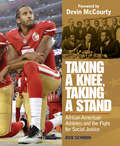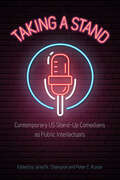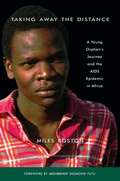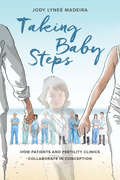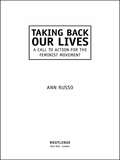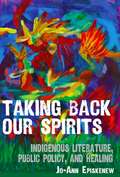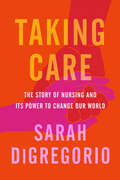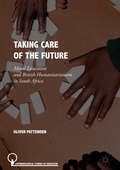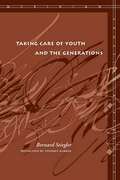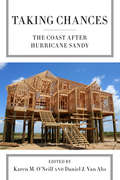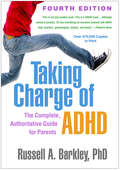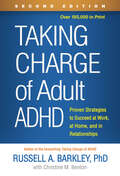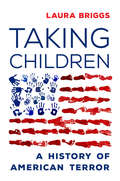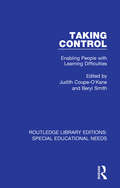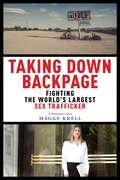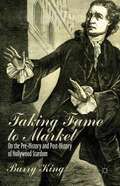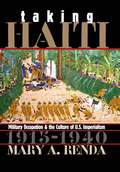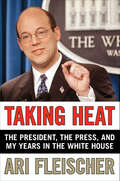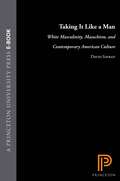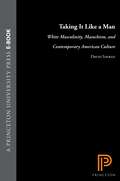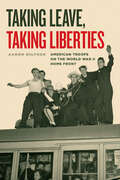- Table View
- List View
Taking a Knee, Taking a Stand: African American Athletes and the Fight for Social Justice
by Bob SchronA history of the activism and achievement of African American athletes from Jesse Owens to Serena Williams to Colin Kaepernick, who advanced the cause of social justice through their outspokenness, commitment, and integrity. Muhammad Ali refused to fight in a war he believed was immoral. Wilma Rudolph retired from track and field to campaign for civil rights. Colin Kaepernick took a knee during the national anthem to draw attention to the oppression of black bodies. Taking a Knee, Taking a Stand tells their stories and the stories of other prominent African American male and female athletes who often risked their careers to fight racial discrimination and promote social justice. From Jackie Robinson breaking the color line in major league baseball to NBA great Bill Russell sitting at the feet of Dr. Martin Luther King at the 1963 March on Washington to Althea Gibson asserting her tennis dominance at a time when many clubs would not allow African Americans to play on their courts, this moving and celebratory history shows how the tradition of black protest in sports has been consistent, necessary, and organic, and that the present crisis of misunderstanding and intolerance demands that this tradition continue as the country struggles toward fairness and equity.
Taking a Stand: Contemporary US Stand-Up Comedians as Public Intellectuals
by Jared N. Champion and Peter C. KunzeContributions by Jared N. Champion, Miriam M. Chirico, Thomas Clark, David R. Dewberry, Christopher J. Gilbert, David Gillota, Kathryn Kein, Rob King, Rebecca Krefting, Peter C. Kunze, Linda Mizejewski, Aviva Orenstein, Raúl Pérez, Philip Scepanski, Susan Seizer, Monique Taylor, Ila Tyagi, and Timothy J. Viator Stand-up comedians have a long history of walking a careful line between serious and playful engagement with social issues: Lenny Bruce questioned the symbolic valence of racial slurs, Dick Gregory took time away from the stage to speak alongside Martin Luther King Jr., and—more recently—Tig Notaro challenged popular notions of damaged or abject bodies. Stand-up comedians deploy humor to open up difficult topics for broader examination, which only underscores the social and cultural importance of their work. Taking a Stand: Contemporary US Stand-Up Comedians as Public Intellectuals draws together essays that contribute to the analysis of the stand-up comedian as public intellectual since the 1980s. The chapters explore stand-up comedians as contributors to and shapers of public discourse via their live performances, podcasts, social media presence, and political activism. Each chapter highlights a stand-up comedian and their ongoing discussion of a cultural issue or expression of a political ideology/standpoint: Lisa Lampanelli’s use of problematic postracial humor, Aziz Ansari’s merging of sociology and technology, or Maria Bamford’s emphasis on mental health, to name just a few. Taking a Stand offers a starting point for understanding the work stand-up comedians do as well as its reach beyond the stage. Comedians influence discourse, perspectives, even public policy on myriad issues, and this book sets out to take those jokes seriously.
Taking America Back: The Conservative Movement and the Far Right
by David Austin WalshA provocative look at the relationship between the far right and the American conservative movement from the 1930s to the end of the Cold War Since 2016, many commentators have expressed shock at the so-called rise of the far right in America at the expense of "responsible" and "respectable" conservatism. But is the far right an aberration in conservative politics? As David Austin Walsh shows, the mainstream conservative movement and the far right have been intertwined for nearly a century, and both were born out of a "right-wing popular front" linking racists, anti-Semites, and fascists in a broad coalition opposed to socialism, communism, and New Deal liberalism. Far from being outliers in the broader conservative coalition, these extremist elements were foundational in the creation of a right‑wing political culture centered around shared political enemies, a penchant for conspiracy theories, and a desire to restore America to its "authentic" pre–New Deal values. The popular front included Merwin Hart, a New York business lobbyist active in far-right circles who became a lobbyist for the Franco regime in Spain, the original "America First" movement, the movement to prevent Jewish immigration to the United States after World War II, the John Birch Society, the American Nazi Party, the George Wallace presidential campaign of 1968, the fight over the National Endowment for the Humanities, and Pat Buchanan’s support of Nazi war criminal John Demjanjuk during the Reagan Administration. And connecting this disparate coalition was William F. Buckley, Jr., the editor of National Review and America’s leading "responsible conservative.&rdquo
Taking Away the Distance: A Young Orphan's Journey and the AIDS Epidemic in Africa
by Miles RostonIn this emotional story of hope and inspiration, an African boy, orphaned by AIDS becomes a catalyst for AIDS orphans worldwide. Living in a shantytown in Kenya, Kevin Sumba's life was one of loneliness and hardship. Yet he was determined to get an education. Miles Roston, a documentary filmmaker, first met Kevin while making a film on AIDS orphans. He found that this particular boy touched his heart in a way he hadn't anticipated. Together, they set out to answer "Kevin's Questions" about the AIDS epidemic and more specifically, Kevin's situation. Taking Away the Distance takes us on a singular journey, as powerful policymakers and those working at a grassroots level deal with the direct, and at times confronting, questions of one boy. Along the way, we also meet people directly impacted by the epidemic and face their lives heroically: from children surviving homelessness on Nairobi's streets to a mother on her deathbed whose only thought is how to care for the children she will leave behind. As Kevin and Roston form a bond of love and respect, each learning from the other, we discover just how much our own lives can change if we dare to help.
Taking Baby Steps: How Patients and Fertility Clinics Collaborate in Conception
by Jody Lyneé MadeiraIn Taking Baby Steps, Jody Lyneé Madeira takes readers inside the infertility experience, from dealing with infertility-related emotions to forming treatment relationships with medical professionals and confronting difficult medical decisions. Based on hundreds of interviews, this book investigates how women, men, and medical professionals negotiate infertility’s rocky terrain to create life and build families—a journey across personal, medical, legal, and ethical minefields that can test mental and physical health, friendships and marriages, spirituality, and financial security.
Taking Back Our Lives: A Call to Action for the Feminist Movement
by Ann RussoFirst published in 2001. Routledge is an imprint of Taylor & Francis, an informa company.
Taking Back Our Spirits: Indigenous Literature, Public Policy, and Healing
by Jo-Ann EpiskenewFrom the earliest settler policies to deal with the “Indian problem,” to contemporary government-run programs ostensibly designed to help Indigenous people, public policy has played a major role in creating the historical trauma that so greatly impacts the lives of Canada’s Aboriginal peoples. Taking Back Our Spirits traces the link between Canadian public policies, the injuries they have inflicted on Indigenous people, and Indigenous literature’s ability to heal individuals and communities. Episkenew examines contemporary autobiography, fiction, and drama to reveal how these texts respond to and critique public policy, and how literature functions as “medicine” to help cure the colonial contagion.
Taking Care: The Story of Nursing and Its Power to Change Our World
by Sarah DiGregorioIn this sweeping cultural history of nursing from the Stone Age to the present, the critically acclaimed author of Early pays homage to the profession and makes an urgent call for change. Nurses have always been vital to human existence. A nurse was likely there when you were born and a nurse might well be there when you die. Familiar in hospitals and doctors’ offices, these dedicated health professionals can also be found in schools, prisons, and people’s homes; at summer camps; on cruise ships, and even at NASA. Yet despite being celebrated during the Covid-19 epidemic, nurses are often undermined and undervalued in ways that reflect misogyny and racism, and that extend to their working conditions—and affect the care available to everyone. But the potential power of nursing to create a healthier, more just world endures.The story of nursing is complicated. It is woven into war, plague, religion, the economy, and our individual lives in myriad ways. In Taking Care, journalist Sarah DiGregorio chronicles the lives of nurses past and tells the stories of those today—caregivers at the vital intersection of health care and community who are actively changing the world, often invisibly. An absorbing and empathetic work that combines storytelling with nuanced reporting, Taking Care examines how we have always tried to care for each other—the incredible ways we have succeeded and the ways in which we have failed. Fascinating, empowering and significant, it is a call for change and a love letter to the nurses of yesterday, today, and tomorrow.
Taking Care of the Future: Moral Education And British Humanitarianism In South Africa (Anthropological Studies Of Education Ser.)
by Oliver PattendenTaking Care of the Future examines the moral dimensions and transformative capacities of education and humanitarianism through an intimate portrayal of learners, volunteers, donors, and educators at a special needs school in South Africa and a partnering UK-based charity. Drawing on his professional experience of “inclusive education” in London, Oliver Pattenden investigates how systems of schooling regularly exclude and mishandle marginalized populations, particularly exploring how “street kids” and poverty-afflicted young South Africans experience these dynamics as they attempt to fashion their futures. By unpacking the ethical terrains of fundraising, voluntourism, Christian benevolence, human rights, colonial legacies, and the post-apartheid transition, Pattenden analyzes how political, economic and social aspects of intervention materialize to transform the lives of all those involved.
Taking Care of Your Child
by Pantell Robert H. Fries James F. Vickery Donald M.Over a million and a half families already use Taking Care of Your Child to help keep their children healthy. Updated with the most recent research and recommendations, this award-winning guide discusses common medical problems, as well as emotional issues such as new siblings and school challenges. The authors even provide forms for medical, growth, and immunization records. And unlike other children's health books, this comprehensive guide is useful from birth through a child's adolescence. Taking Care of Your Child is easy to use, even in a crisis. Simply look up a symptom, and you find a complete explanation of probable causes, how serious they are, and how you might quickly relieve your child's problem at home. Easy-to-follow decision charts show parents exactly when to take a child to see a doctor. This book covers more than 100 common complaints-injuries and allergies, childhood diseases-with especially clear advice on handling emergencies.
Taking Care Of Youth And The Generations
by Bernard StieglerTaking Care exposes the carelessness of these industries and urges the reader to re-enter the "battle for intelligence" against the drive-oriented culture of short-term ("short-circuited") attention characteristic of the negative aspects of the new technologies.
Taking Chances: The Coast after Hurricane Sandy
by Mark Alan Hewitt Mariana Leckner Bonnie Mccay Briavel Holcomb Angela Oberg Melanie Mcdermott Steven G. Decker Professor Karen M. O'Neill Patricia M. Clay Daniel Redlaswk Frank A. Felder Clinton J. Andrews Adelle Thomas Lisa L. Colburn Larry Niles Daniel Baldwin Hess Robert B. Gramling David A. Robinson Joanna Burger Brian W. Conley James K. Mitchell Kenneth A. Gould Ashley Koning Shankar Chandramowli Tammy L. Lewis Daniel J. Van Abs Julia FlaggHumanity is deeply committed to living along the world's shores, but a catastrophic storm like Sandy--which took hundreds of lives and caused many billions of dollars in damages--shines a bright light at how costly and vulnerable life on a shoreline can be. Taking Chances offers a wide-ranging exploration of the diverse challenges of Sandy and asks if this massive event will really change how coastal living and development is managed. Bringing together leading researchers--including biologists, urban planners, utilities experts, and climatologists, among others--Taking Chances illuminates reactions to the dangers revealed by Sandy. Focusing on New Jersey, New York, and other hard-hit areas, the contributors explore whether Hurricane Sandy has indeed transformed our perceptions of coastal hazards, if we have made radically new plans in response to Sandy, and what we think should be done over the long run to improve coastal resilience. Surprisingly, one essay notes that while a large majority of New Jerseyans identified Sandy with climate change and favored carefully assessing the likelihood of damage from future storms before rebuilding the Shore, their political leaders quickly poured millions into reconstruction. Indeed, much here is disquieting. One contributor points out that investors scared off from further investments on the shore are quickly replaced by new investors, sustaining or increasing the overall human exposure to risk. Likewise, a study of the Gowanus Canal area of Brooklyn shows that, even after Sandy swamped the area with toxic flood waters, plans to convert abandoned industrial lots around the canal into high-density condominiums went on undeterred. By contrast, utilities, emergency officials, and others who routinely make long-term plans have changed operations in response to the storm, and provide examples of adaptation in the face of climate change. Will Sandy be a tipping point in coastal policy debates--or simply dismissed as a once-in-a-century anomaly? This thought-provoking collection of essays in Taking Chances makes an important contribution to this debate.
Taking Charge of ADHD, Fourth Edition: The Complete, Authoritative Guide for Parents
by Russell A. BarkleyThe leading parent resource about attention-deficit/hyperactivity disorder (ADHD) and its treatment has now been revised and updated with the latest information and resources. Prominent authority Russell A. Barkley compassionately guides you to: *Understand why kids with ADHD act the way they do. *Get an accurate diagnosis. *Work with school and health care professionals to find needed support. *Implement a proven eight-step behavior management plan. *Build your child's academic and social skills. *Restore harmony at home. New to the fourth edition are a chapter on health risks associated with ADHD, the latest information on the causes of the disorder, current facts on medications, a new discussion of sibling issues, advice for parents who might have ADHD themselves, downloadable practical tools, and much more.
Taking Charge of Adult ADHD, Second Edition: Proven Strategies to Succeed at Work, at Home, and in Relationships
by Russell A. BarkleyIf you're among the millions of adults with attention-deficit/hyperactivity disorder (ADHD), you need the latest facts about the disorder and its treatment. You need practical strategies to help develop your strengths and achieve your goals, whether on the job, in family relationships, or in personal pursuits. From renowned ADHD researcher/clinician Russell A. Barkley, this is the book for you. Dr. Barkley takes you through the process of seeking professional help, addresses frequently asked questions about medications and other treatments, and offers a wealth of advice and tips--all science-based. Featuring the latest resources and medication facts, the revised and updated second edition includes new or expanded discussions of mindfulness, emotional self-control, time management, building a successful career, maintaining a healthy lifestyle, and more. Finally, an authoritative one-stop resource to help you take back your life from ADHD.
Taking Children: A History of American Terror
by Laura Briggs"You have to take the children away."—Donald Trump Taking Children argues that for four hundred years the United States has taken children for political ends. Black children, Native children, Latinx children, and the children of the poor have all been seized from their kin and caregivers. As Laura Briggs’s sweeping narrative shows, the practice played out on the auction block, in the boarding schools designed to pacify the Native American population, in the foster care system used to put down the Black freedom movement, in the US’s anti-Communist coups in Central America, and in the moral panic about "crack babies." In chilling detail we see how Central Americans were made into a population that could be stripped of their children and how every US administration beginning with Reagan has put children of immigrants and refugees in detention camps. Yet these tactics of terror have encountered opposition from every generation, and Briggs challenges us to stand and resist in this powerful corrective to American history.
Taking Control: Enabling People with Learning Difficulties (Routledge Library Editions: Special Educational Needs #12)
by Judith Coupe-O’Kane Beryl SmithFirst published in 1994. This book pays tribute to the many parents and professionals who work and live with people who have learning difficulties. Enabling people with learning difficulties to take control may be achieved in a number of ways, ranging from systematic application of theory in programmes of learning and development, to a largely intuitive response. The Editors hope that the issues and reflections raised in this book will inspire all practitioners to continue to adopt an enquiring attitude towards ways in which people with learning difficulties can exert effective control over the operation of their lives.
Taking Down Backpage: Fighting the World’s Largest Sex Trafficker
by Maggy KrellInsider details from the takedown of Backpage, the world’s largest sex trafficker, by the prosecutor who led the charge For almost a decade, Backpage.com was the world’s largest sex trafficking operation. Seven days a week, twenty-four hours a day, in 800 cities throughout the world, Backpage ran thousands of listings advertising the sale of vulnerable young people for sex. Reaping a cut off every transaction, the owners of the website raked in millions of dollars. But many of the people in the advertisements were children, as young as 12, and forced into the commercial sex trade through fear, violence and coercion. In Taking Down Backpage, veteran California prosecutor Maggy Krell tells the story of how she and her team battled against this sex trafficking monolith. Beginning with her early career as a young DA, she shares the evolution of the anti-human trafficking movement. Through a fascinating combination of memoir and legal insight, Krell reveals how she and her team started with the prosecution of street pimps and ultimately ended with the takedown of the largest purveyor of human trafficking in the world. She shares powerful stories of interviews with survivors, sting operations, court cases, and the personal struggles that were necessary to bring Backpage executives to justice. Finally, Krell examines the state of sex trafficking after Backpage and the crucial work that still remains. Taking Down Backpage is a gripping story of tragedy, overcoming adversity, and the pursuit of justice that gives insight into the fight against sex trafficking in the digital age.
Taking Fame to Market
by Barry KingThis book explores, from a sociological perspective, the relationship between acting as symbolic work and the commercialization of popular culture. Particular attention is paid to the social conditions that gave rise to stardom in the theatre and cinema, and how shifts in the marketing of stars have impacted upon contemporary celebrity culture.
Taking Flight: Caribbean Women Writing from Abroad (Caribbean Studies Series)
by Jennifer DonahueCaribbean women have long utilized the medium of fiction to break the pervasive silence surrounding abuse and exploitation. Contemporary works by such authors as Tiphanie Yanique and Nicole Dennis-Benn illustrate the deep-rooted consequences of trauma based on gender, sexuality, and race, and trace the steps that women take to find safer ground from oppression. Taking Flight examines the immigrant experience in contemporary Caribbean women’s writing and considers the effects of restrictive social mores. In the texts examined in Taking Flight, culturally sanctioned violence impacts the ability of female characters to be at home in their bodies or in the spaces they inhabit. The works draw attention to the historic racialization and sexualization of black women’s bodies and continue the legacy of narrating black women’s long-standing contestation of systems of oppression. Arguing that there is a clear link between trauma, shame, and migration, with trauma serving as a precursor to the protagonists’ emigration, Jennifer Donahue focuses on how female bodies are policed; how moral, racial, and sexual codes are linked; and how the enforcement of social norms can function as a form of trauma. Donahue considers the relationship between trauma, shame, and sexual politics and investigates how shame works as a social regulator that frequently leads to withdrawal or avoidant behaviors in those who violate socially sanctioned mores. Most importantly, Taking Flight positions flight as a powerful counter to disempowerment and considers how flight, whether through dissociation or migration, functions as a form of resistance.
Taking Haiti
by Mary A. RendaThe U.S. invasion of Haiti in July 1915 marked the start of a military occupation that lasted for nineteen years--and fed an American fascination with Haiti that flourished even longer. Exploring the cultural dimensions of U.S. contact with Haiti during the occupation and its aftermath, Mary Renda shows that what Americans thought and wrote about Haiti during those years contributed in crucial and unexpected ways to an emerging culture of U.S. imperialism.At the heart of this emerging culture, Renda argues, was American paternalism, which saw Haitians as wards of the United States. She explores the ways in which diverse Americans--including activists, intellectuals, artists, missionaries, marines, and politicians--responded to paternalist constructs, shaping new versions of American culture along the way. Her analysis draws on a rich record of U.S. discourses on Haiti, including the writings of policymakers; the diaries, letters, songs, and memoirs of marines stationed in Haiti; and literary works by such writers as Eugene O'Neill, James Weldon Johnson, Langston Hughes, and Zora Neale Hurston.Pathbreaking and provocative, Taking Haiti illuminates the complex interplay between culture and acts of violence in the making of the American empire.
Taking Heat: The President, the Press, and My Years in the White House
by Ari FleischerThe early years of the twenty-first century were a tumultuous time in America. The country faced a hotly contested presidential election, the largest terrorist attack in the nation's history, and the early stages of war. Through it all, President George W. Bush surrounded himself with a handful of close advisers. During this time the man beside the President was Ari Fleischer, his press secretary and one of his most trusted confidants. In this role, Fleisher was present for every decision and became an eyewitness to history.In this riveting account, Fleischer goes behind the scenes as he recalls his experiences in the West Wing. Through the ups and downs of this time, he took the heat, fielded the questions, and brought the President's message into living rooms around the world.In Taking Heat, Fleischer, for the first time, gives his perspective on:The 2000 election, from the recounts to the transition to powerSeptember 11, 2001, its aftermath, and the anthrax scareThe pressure-filled buildup to the war in Iraq and the President's thoughts as the war beganLife in the White House, from learning to adjust to the pace of the West Wing and his early briefings to his relationship with the pressThe White House press corps, who they are, and how they report the newsThe factors that led to his decision to leave Washington behind.This is the story of the men and women of the White House press corps and the cornerstones of democracy: freedom of speech and the freedom of the press. Fleischer presents an in-depth, insider's view on the Washington political arena from a perspective few have seen.Fleischer writes of his belief that the press has a bias in Washington. It's not a question of partisanship or press-driven ideology. Instead, it's a focus on conflict, particularly if it's a conflict they can attach to the President. It's the nature of the White House press corps, regardless of who's in power. The members of the White House press corps are masters at being devil's advocate, able to take with passion the opposite side of whatever issue the President supports. Fleischer's job was to calmly field their questions, no matter how pointed.Taking Heat is an introspective exploration of the top political events in the first half of the Bush administration, as well as the candid observations of a professional who stood in the bright lights of the world stage.
Taking Humour Seriously
by Mr Jerry Palmer Jerry PalmerFirst published in 1993. Routledge is an imprint of Taylor & Francis, an informa company.
Taking It Like a Man: White Masculinity, Masochism, and Contemporary American Culture
by David SavranFrom the Beat poets' incarnation of the "white Negro" through Iron John and the Men's Movement to the paranoid masculinity of Timothy McVeigh, white men in this country have increasingly imagined themselves as victims. In Taking It Like a Man, David Savran explores the social and sexual tensions that have helped to produce this phenomenon. <p><p>Beginning with the 1940s, when many white, middle-class men moved into a rule-bound, corporate culture, Savran sifts through literary, cinematic, and journalistic examples that construct the white man as victimized, feminized, internally divided, and self-destructive. Savran considers how this widely perceived loss of male power has played itself out on both psychoanalytical and political levels as he draws upon various concepts of masochism—the most counterintuitive of the so-called perversions and the one most insistently associated with femininity. <p><p> Savran begins with the writings and self-mythologization of Beat writers William Burroughs, Allen Ginsberg, and Jack Kerouac. Although their independent, law-defying lifestyles seemed distinctively and ruggedly masculine, their literary art and personal relations with other men in fact allowed them to take up social and psychic positions associated with women and racial minorities. Arguing that this dissident masculinity has become increasingly central to U.S. culture, Savran analyzes the success of Sam Shepard as both writer and star, as well as the emergence of a new kind of action hero in movies like Rambo and Twister. He contends that with the limited success of the civil rights and women's movements, white masculinity has been reconfigured to reflect the fantasy that the white male has become the victim of the scant progress made by African Americans and women. <p><p> Taking It Like a Man provocatively applies psychoanalysis to history. The willingness to inflict pain upon the self, for example, serves as a measure of men's attempts to take control of their situations and their ambiguous relationship to women. Discussing S/M and sexual liberation in their historical contexts enables Savran to consider not only the psychological function of masochism but also the broader issues of political and social power as experienced by both men and women.
Taking It Like a Man: White Masculinity, Masochism, and Contemporary American Culture
by David SavranFrom the Beat poets' incarnation of the "white Negro" through Iron John and the Men's Movement to the paranoid masculinity of Timothy McVeigh, white men in this country have increasingly imagined themselves as victims. In Taking It Like a Man, David Savran explores the social and sexual tensions that have helped to produce this phenomenon. Beginning with the 1940s, when many white, middle-class men moved into a rule-bound, corporate culture, Savran sifts through literary, cinematic, and journalistic examples that construct the white man as victimized, feminized, internally divided, and self-destructive. Savran considers how this widely perceived loss of male power has played itself out on both psychoanalytical and political levels as he draws upon various concepts of masochism--the most counterintuitive of the so-called perversions and the one most insistently associated with femininity.Savran begins with the writings and self-mythologization of Beat writers William Burroughs, Allen Ginsberg, and Jack Kerouac. Although their independent, law-defying lifestyles seemed distinctively and ruggedly masculine, their literary art and personal relations with other men in fact allowed them to take up social and psychic positions associated with women and racial minorities. Arguing that this dissident masculinity has become increasingly central to U.S. culture, Savran analyzes the success of Sam Shepard as both writer and star, as well as the emergence of a new kind of action hero in movies like Rambo and Twister. He contends that with the limited success of the civil rights and women's movements, white masculinity has been reconfigured to reflect the fantasy that the white male has become the victim of the scant progress made by African Americans and women.Taking It Like a Man provocatively applies psychoanalysis to history. The willingness to inflict pain upon the self, for example, serves as a measure of men's attempts to take control of their situations and their ambiguous relationship to women. Discussing S/M and sexual liberation in their historical contexts enables Savran to consider not only the psychological function of masochism but also the broader issues of political and social power as experienced by both men and women.
Taking Leave, Taking Liberties: American Troops on the World War II Home Front
by Aaron HiltnerAmerican soldiers overseas during World War II were famously said to be “overpaid, oversexed, and over here.” But the assaults, rapes, and other brutal acts didn’t only happen elsewhere, far away from a home front depicted as safe and unscathed by the “good war.” To the contrary, millions of American and Allied troops regularly poured into ports like New York and Los Angeles while on leave. Euphemistically called “friendly invasions,” these crowds of men then forced civilians to contend with the same kinds of crime and sexual assault unfolding in places like Britain, France, and Australia. With unsettling clarity, Aaron Hiltner reveals what American troops really did on the home front. While GIs are imagined to have spent much of the war in Europe or the Pacific, before the run-up to D-Day in the spring of 1944 as many as 75% of soldiers were stationed in US port cities, including more than three million who moved through New York City. In these cities, largely uncontrolled soldiers sought and found alcohol and sex, and the civilians living there—women in particular—were not safe from the violence fomented by these de facto occupying armies. Troops brought their pocketbooks and demand for “dangerous fun” to both red-light districts and city centers, creating a new geography of vice that challenged local police, politicians, and civilians. Military authorities, focused above all else on the war effort, invoked written and unwritten legal codes to grant troops near immunity to civil policing and prosecution. The dangerous reality of life on the home front was well known at the time—even if it has subsequently been buried beneath nostalgia for the “greatest generation.” Drawing on previously unseen military archival records, Hiltner recovers a mostly forgotten chapter of World War II history, demonstrating that the war’s ill effects were felt all over—including by those supposedly safe back home.
